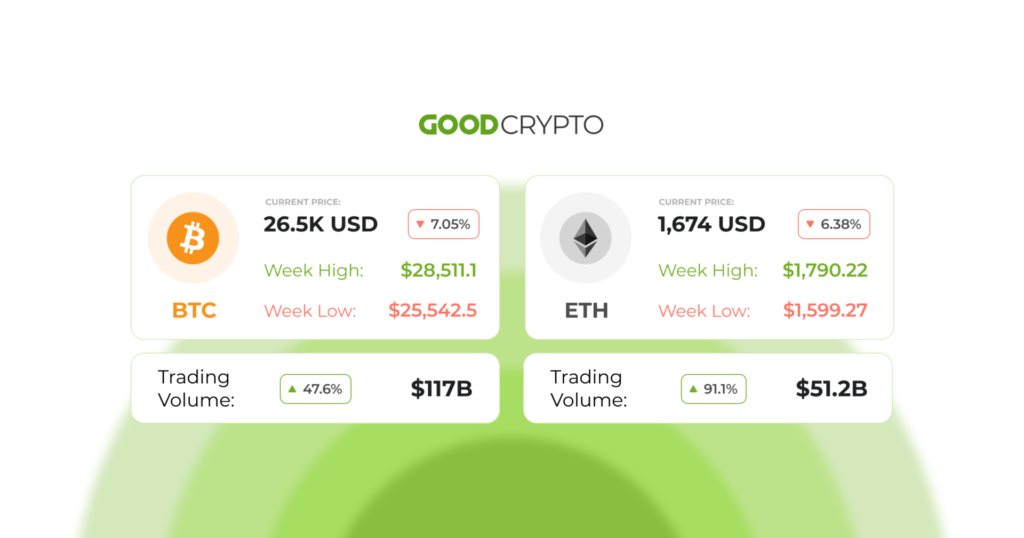Hi there!
We have brought together the past week’s most exciting events in this Good Crypto digest. If you want to get these updates as soon as we post them, follow us on Twitter or Telegram.
Quick weekly news
Binance US Partners with MoonPay to Enhance User Experience
Binance.US, now fully crypto-focused, has unveiled a strategic collaboration with crypto payment entity MoonPay. This partnership facilitates the acquisition of USD-pegged stablecoin Tether (USDT) by users for use on Binance US.
In a recent announcement on August 22, the crypto exchange revealed that USDT would be the new “base asset” for all transactions, enabling users to engage in transactions denominated in U.S. dollars. This move follows Binance US’s recent banking issues that suspended fiat deposits on June 9, a situation attributed to the Securities and Exchange Commission’s aggressive actions towards the exchange.
Users of Binance US can now convert their dollars into USDT, which can subsequently be utilized to access a variety of cryptocurrencies on the platform. Although direct bank deposits remain unavailable, this partnership furnishes users with an alternative route for purchasing via debit and credit cards, as well as Apple and Google Pay.
Terra Temporarily Halts Website Due to Phishing Scams
Layer-1 blockchain Terra temporarily halted its website due to ongoing phishing scams aiming to protect users. Terra confirmed successfully freezing problematic “terra(dot) money” domains, though the full resolution is ongoing, as stated on August 22. Users are advised to avoid those domains until an official “all-clear” notice is issued.
Though some third-party responses have caused delays, Terra acknowledged attempts to address the issue have been continuous. Additionally, the announcement highlighted updates on the multichain wallet Station Wallet, offering secure access to decentralized applications across various blockchain networks like Terra, Juno, and Kujira.
Notably, Station Wallet posted significant safety updates on August 21 and cautioned users to refrain from using Station desktop and mobile apps until their security is confirmed. Updated browser extensions and app links were also provided for secure user interaction.
Bitstamp Halts Staking Services for U.S. Users Amid Legal Considerations
Bitstamp, the crypto exchange, is discontinuing its staking services for U.S. customers. As of September 25, Ether staking will cease, with users continuing to earn rewards until that date. Staked assets will be unstacked, and rewards and principal will be credited to users’ main Bitstamp accounts. Bobby Zagotta, Bitstamp’s U.S. CEO and global chief commercial officer, cautioned that users’ balances might take a few days to reflect these changes.
Bitstamp currently charges a 15% commission on staking rewards. The exchange’s monthly reward rate for staking ETH stands at 4.50%, while for Algorand, it’s 1.60%. The U.S. joins other countries where Bitstamp’s staking services aren’t available, including Canada, Japan, Singapore, and the United Kingdom.
This decision seems to be influenced by recent legal developments in the U.S. In early August, Bitstamp revealed that seven altcoins, including Axie Infinity, Chiliz (CHZ), Decentraland, Polygon, Near, The Sandbox, and Solana, would no longer be offered in the U.S. These tokens were categorized as unregistered securities by the U.S. Securities and Exchange Commission (SEC) in June, a part of the agency’s legal actions against crypto exchanges Binance and Coinbase.
Legal Action Taken Against Tornado Cash Co-Founders for Money Laundering and Unlicensed Operations
Roman Semenov, one of the co-founders of the Tornado Cash cryptocurrency mixer, was included in the United States Treasury’s Office of Foreign Assets Control (OFAC) list of Specially Designated Nationals and Blocked Persons (SDN) on August 23. Simultaneously, Roman Storm, another co-founder, was apprehended by the Federal Bureau of Investigation (FBI) and the Internal Revenue Service Criminal Investigation division in Washington state on the same day.
Semenov and Storm are facing charges of conspiracy to commit money laundering, conspiracy to commit sanctions violations, and conspiracy to operate an unlicensed money-transmitting business, as detailed in an unsealed indictment on August 23. The first two counts each carry a maximum prison sentence of 20 years, while the charge related to unlicensed money transmission could result in up to five years imprisonment.
Damian Williams, the U.S. Attorney for the Southern District of New York, stated in a Justice Department (DOJ) release:
“As alleged, […] while publicly claiming to offer a technically sophisticated privacy service, Storm and Semenov in fact knew that they were helping hackers and fraudsters conceal the fruits of their crimes.
Unveiling MOM Strategy: Combining Divergence Trading with EMA
The Momentum Oscillator (MOM) doesn’t just stop at momentum tracking; it’s a handy tool for spotting divergences on your charts. A divergence materializes when price movements don’t align with the MOM’s evolution. Like other momentum indicators such as Stochastic or RSI oscillators, a MOM divergence can signal a potential shift in price direction.
Divergences can be categorized into classic (regular) divergence and hidden divergence. While classic divergence points to a trend reversal, hidden divergence suggests trend continuation.
We’ve compiled a comprehensive cheat sheet outlining the distinctions between classic and hidden divergence. Find more in our article.
Receive an instant notification when a new coin is listed with GoodCrypto’s PRO plan.
Top Crypto Meme of the Week
We hope this digest was valuable and informative for you! If you want to be the first to receive new crypto insights and stay up-to-date with the market, follow us on Twitter or Telegram. Become a better trader with the Good Crypto App!
